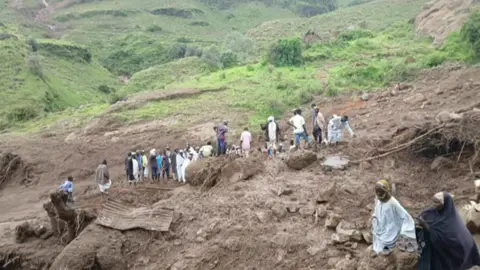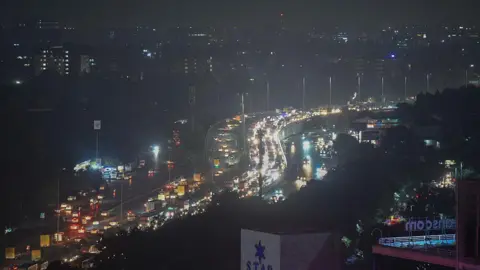Parts of the southern Indian city of Bengaluru, known as India's Silicon Valley, are experiencing severe flooding after heavy rainfall that began on Sunday. The regional weather department has reported over 100 mm (around 4 inches) of rain, marking a record for the area since 2011 and signaling potential further downpours due to cyclonic activities in the Andaman Sea. The flooding has tragically resulted in the deaths of three individuals, including a 12-year-old boy, from rain-related incidents.
With major global technology firms headquartered in Bengaluru, many companies have opted to implement work-from-home policies for employees due to inundated roads and unsafe commuting conditions. The rainy weather has wreaked havoc in various neighborhoods, causing significant traffic disruptions and property damage - including the tragic collapse of a compound wall at the i-Zed software firm, which resulted in the death of a female employee.
Videos circulating online reveal scenes of chaotic commutes, with citizens navigating knee-deep waters and cars left stranded on submerged streets. Some residents have even reported water invading their homes. In response to the disaster, city authorities have identified over 210 areas prone to flooding and have committed to working tirelessly to address the crisis. "Residents of Bengaluru need not panic," assured DK Shivakumar, Karnataka's deputy chief minister. However, social media platforms are ablaze with criticism directed at local governance and the deteriorating infrastructure that many believe has exacerbated the flooding crisis.
Annu Itty, a long-term resident, voiced her frustration, pointing out that the tech-sector's newly developed regions are experiencing some of the worst flooding. She attributes the problem to insufficient urban planning that does not take environmental constraints into account, alongside a lack of accountability from the government.
The political landscape adds further complexity, as the ruling Congress party faces accusations from the opposition Bharatiya Janata Party (BJP), which has called for the immediate allocation of 10 billion rupees (approximately $117 million) for relief initiatives. While the BJP criticizes the government for failing to remediate rain-related complications, the state authorities defend their actions by highlighting that flooding is a longstanding issue that transcends individual administrations.
Flooding has become an increasingly common sight in Bengaluru, with experts emphasizing that poor urban planning, rapid construction over the city's lakes and wetlands, and neglect of essential infrastructure are largely to blame. Ananda Rao, president of the Association for Information Technology (AIT), which comprises over 450 software companies, expressed concern regarding the impact of regular flooding on businesses. He urged the state government to invest in long-term solutions to bolster the city's infrastructure, asserting, "Bengaluru contributes significantly in taxes – both at an individual and property tax level – yet there is no return on this investment."






















